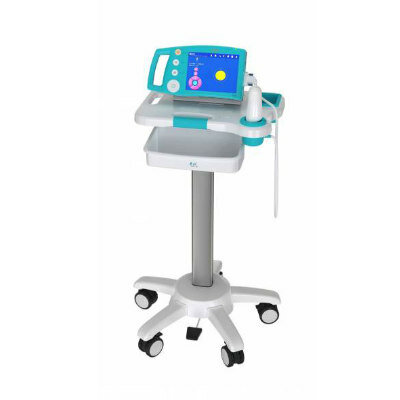AI Analyzes Data from MRI Scans, Biopsy and Blood Values to Diagnose Intestinal and Brain Disorders
|
By MedImaging International staff writers Posted on 30 Jan 2024 |

Healthcare is now evolving towards a computer system that learns from extensive medical data and offers personalized advice for patients. This could involve, for instance, comparing a patient's MRI scan with a database of scans and comprehensive medical histories from similar cases. The complexity of this system lies in handling various data types, including textual information, blood test results, medical imagery, and genetic data.
An international team of researchers, which includes investigators from the Radboud University Medical Center in Nijmegen, Netherlands, and backed by a EURO 11 million grant from the European Commission, is in the process of creating an artificial intelligence (AI) system. This AI is designed to provide insights into several brain and intestinal disorders such as depression, anxiety, and obesity, and to explore the interrelations between these conditions. The computer system, named Ciompi, will be capable of connecting and analyzing diverse types of medical data. The focus is on disorders related to the brain and intestines due to the significant interplay between these two organs, known as the "gut-brain axis." The system will look for patterns in this multimodal data, like the simultaneous presence of specific conditions or states.
A considerable amount of data is already available from earlier studies, including 20,000 digitized images of intestinal polyps and biopsies, data on intestinal bacteria, genetic information, and numerous MRI brain scans. The researchers plan to interlink these data sets, and the broader scope of the EU project includes examining factors like air pollution. The computer system will employ algorithms that learn from this pool of data. These algorithms will be housed on the Grand Challenge platform, renowned for hosting global competitions to develop superior algorithms for medical image analysis, like CT or MRI scans. This platform also supports hosting various algorithms and data types, accessible in different formats. Presently, the platform accommodates medical images and digital pathology slides, but the project aims to incorporate additional data types such as genetic information. The new algorithms will be integrated into this platform. However, not all the data used for training the system will be stored online.
Increasingly, 'federated' methods are being employed to both train AI algorithms and access data. For example, in federated learning, the algorithms virtually visit different hospitals via the platform, learning directly from the medical data on-site, without the need to transfer the data out of the hospital. Once the algorithms have sufficiently learned from these virtual visits, they can then aid doctors in the future. For instance, Ciompi will be able to compare a patient's diverse data from the gut and brain, such as fMRI scans, intestinal biopsies, and metabolome sequences from fecal samples, with scans and medical records from similar cases. This system can then assist healthcare providers in diagnosing, predicting outcomes, identifying potential connections with other conditions, and recommending treatment strategies.
Related Links:
Radboud University Medical Center
Latest MRI News
- PET/MRI Improves Diagnostic Accuracy for Prostate Cancer Patients
- Next Generation MR-Guided Focused Ultrasound Ushers In Future of Incisionless Neurosurgery
- Two-Part MRI Scan Detects Prostate Cancer More Quickly without Compromising Diagnostic Quality
- World’s Most Powerful MRI Machine Images Living Brain with Unrivaled Clarity
- New Whole-Body Imaging Technology Makes It Possible to View Inflammation on MRI Scan
- Combining Prostate MRI with Blood Test Can Avoid Unnecessary Prostate Biopsies
- New Treatment Combines MRI and Ultrasound to Control Prostate Cancer without Serious Side Effects
- MRI Improves Diagnosis and Treatment of Prostate Cancer
- Combined PET-MRI Scan Improves Treatment for Early Breast Cancer Patients
- 4D MRI Could Improve Clinical Assessment of Heart Blood Flow Abnormalities
- MRI-Guided Focused Ultrasound Therapy Shows Promise in Treating Prostate Cancer
- AI-Based MRI Tool Outperforms Current Brain Tumor Diagnosis Methods
- DW-MRI Lights up Small Ovarian Lesions like Light Bulbs
- Abbreviated Breast MRI Effective for High-Risk Screening without Compromising Diagnostic Accuracy
- New MRI Method Detects Alzheimer’s Earlier in People without Clinical Signs
- MRI Monitoring Reduces Mortality in Women at High Risk of BRCA1 Breast Cancer
Channels
Radiography
view channel
Novel Breast Imaging System Proves As Effective As Mammography
Breast cancer remains the most frequently diagnosed cancer among women. It is projected that one in eight women will be diagnosed with breast cancer during her lifetime, and one in 42 women who turn 50... Read more
AI Assistance Improves Breast-Cancer Screening by Reducing False Positives
Radiologists typically detect one case of cancer for every 200 mammograms reviewed. However, these evaluations often result in false positives, leading to unnecessary patient recalls for additional testing,... Read moreUltrasound
view channel
Deep Learning Advances Super-Resolution Ultrasound Imaging
Ultrasound localization microscopy (ULM) is an advanced imaging technique that offers high-resolution visualization of microvascular structures. It employs microbubbles, FDA-approved contrast agents, injected... Read more
Novel Ultrasound-Launched Targeted Nanoparticle Eliminates Biofilm and Bacterial Infection
Biofilms, formed by bacteria aggregating into dense communities for protection against harsh environmental conditions, are a significant contributor to various infectious diseases. Biofilms frequently... Read moreNuclear Medicine
view channel
New SPECT/CT Technique Could Change Imaging Practices and Increase Patient Access
The development of lead-212 (212Pb)-PSMA–based targeted alpha therapy (TAT) is garnering significant interest in treating patients with metastatic castration-resistant prostate cancer. The imaging of 212Pb,... Read moreNew Radiotheranostic System Detects and Treats Ovarian Cancer Noninvasively
Ovarian cancer is the most lethal gynecological cancer, with less than a 30% five-year survival rate for those diagnosed in late stages. Despite surgery and platinum-based chemotherapy being the standard... Read more
AI System Automatically and Reliably Detects Cardiac Amyloidosis Using Scintigraphy Imaging
Cardiac amyloidosis, a condition characterized by the buildup of abnormal protein deposits (amyloids) in the heart muscle, severely affects heart function and can lead to heart failure or death without... Read moreGeneral/Advanced Imaging
view channel
New AI Method Captures Uncertainty in Medical Images
In the field of biomedicine, segmentation is the process of annotating pixels from an important structure in medical images, such as organs or cells. Artificial Intelligence (AI) models are utilized to... Read more.jpg)
CT Coronary Angiography Reduces Need for Invasive Tests to Diagnose Coronary Artery Disease
Coronary artery disease (CAD), one of the leading causes of death worldwide, involves the narrowing of coronary arteries due to atherosclerosis, resulting in insufficient blood flow to the heart muscle.... Read more
Novel Blood Test Could Reduce Need for PET Imaging of Patients with Alzheimer’s
Alzheimer's disease (AD), a condition marked by cognitive decline and the presence of beta-amyloid (Aβ) plaques and neurofibrillary tangles in the brain, poses diagnostic challenges. Amyloid positron emission... Read more.jpg)
CT-Based Deep Learning Algorithm Accurately Differentiates Benign From Malignant Vertebral Fractures
The rise in the aging population is expected to result in a corresponding increase in the prevalence of vertebral fractures which can cause back pain or neurologic compromise, leading to impaired function... Read moreImaging IT
view channel
New Google Cloud Medical Imaging Suite Makes Imaging Healthcare Data More Accessible
Medical imaging is a critical tool used to diagnose patients, and there are billions of medical images scanned globally each year. Imaging data accounts for about 90% of all healthcare data1 and, until... Read more
Global AI in Medical Diagnostics Market to Be Driven by Demand for Image Recognition in Radiology
The global artificial intelligence (AI) in medical diagnostics market is expanding with early disease detection being one of its key applications and image recognition becoming a compelling consumer proposition... Read moreIndustry News
view channel
Bayer and Google Partner on New AI Product for Radiologists
Medical imaging data comprises around 90% of all healthcare data, and it is a highly complex and rich clinical data modality and serves as a vital tool for diagnosing patients. Each year, billions of medical... Read more




















